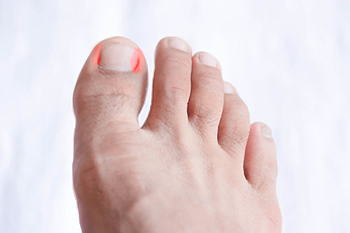
Ingrown toenails are a painful condition where the side or corner of a toenail grows into the soft flesh surrounding it. This often leads to pain, swelling, and sometimes infection, especially in the big toe. It is important to use proper techniques to prevent the formation of an ingrown toenail. Always trim your toenails dry to avoid bending or tearing them, and cut them straight across rather than rounding the edges. This prevents the nail from digging into the skin as it grows. Avoid trimming cuticles, as they act as barriers against infection, and use appropriate tools like manicure scissors or dedicated toenail clippers. It is also important to have separate clippers for your fingers and toes to prevent cross-contamination. If you have diabetes or another condition that impairs blood flow to your feet, you are at a higher risk of complications from ingrown toenails. Therefore, extra caution is warranted. Regularly practicing these proper nail care habits can significantly reduce the likelihood of developing ingrown toenails. However, if you experience severe pain, swelling, or signs of infection, it is suggested that you schedule an appointment with a podiatrist for treatment.
Ingrown toenails can become painful if they are not treated properly. For more information about ingrown toenails, contact Scott Amoss, DPM of Advanced Foot & Ankle Specialists. our doctor can provide the care you need to keep you pain-free and on your feet.
Ingrown Toenails
Ingrown toenails occur when a toenail grows sideways into the bed of the nail, causing pain, swelling, and possibly infection.
Causes
- Bacterial infections
- Improper nail cutting such as cutting it too short or not straight across
- Trauma to the toe, such as stubbing, which causes the nail to grow back irregularly
- Ill-fitting shoes that bunch the toes too close together
- Genetic predisposition
Prevention
Because ingrown toenails are not something found outside of shoe-wearing cultures, going barefoot as often as possible will decrease the likeliness of developing ingrown toenails. Wearing proper fitting shoes and using proper cutting techniques will also help decrease your risk of developing ingrown toenails.
Treatment
Ingrown toenails are a very treatable foot condition. In minor cases, soaking the affected area in salt or antibacterial soaps will not only help with the ingrown nail itself, but also help prevent any infections from occurring. In more severe cases, surgery is an option. In either case, speaking to your podiatrist about this condition will help you get a better understanding of specific treatment options that are right for you.
If you have any questions please feel free to contact our offices located in Whiting and Toms River, NJ . We offer the newest diagnostic and treatment technologies for all your foot and ankle needs.
